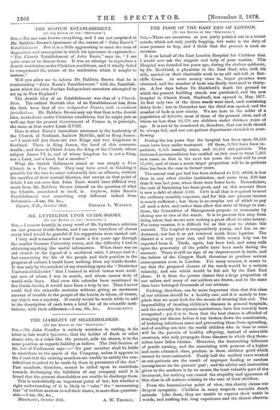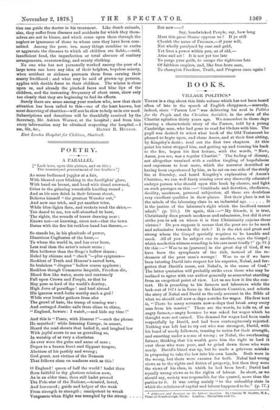THE POOR OF THE EAST END OF LONDON.
[TO THE EDITOR OF THE " SPECTATOR.']
Sin,—There are occasions, as you justly pointed out in a recent article, which not only justify begging, but make it the duty of some persons to beg, and I think that the present is such an occasion.
It is on behalf of the East London Hospital for Children that I would now ask the support and help of your readers. This Hospital was founded ten years ago, during the cholera epidemic, by Dr. Heckford, a physician in the East End, who, with his wife, carried on their charitable work in an old sail-loft at Rat- cliffe Cross. As more money came in, larger premises were obtained, and the number of beds was finally increased to thirty- six. A few days before Dr. Heckford's death the ground on which the present building stands was purchased, and the new hospital in Glamis Road, Shadwell, was opened in May, 1877.. At first only two of the three wards were used, each containing thirty beds ; but in December last the third was opened, and the number of beds is now ninety. We are here in the midst of a population of 400,000, most of them of the poorest class, and of whom no less than 92,370 are children under thirteen years of age. It is not to be wondered at, therefore, that our beds should be always full, and our out-patient department crowded to over- flowing.
During the ten years that the hospital has been open, 68,552 cases have been under treatment. Of these, 3,953 have been in- patients, 8,155 casualty cases, and 56,444 out-patients. The increased accommodation has enabled us this year to treat 7,463 new cases, so that in the next ten years the total will be over 75,000, and of these a much larger proportion will be in-patients than has been the case in former years.
The annual coat per bed has been reduced to 150, which is less than in any other similar institution, and more than 120 less than it was last year, when there were fewer beds. Nevertheless, the cost of furnishing has been great, and on this account there is now a debt of about 1500. £400 is all that is required to meet the ordinary monthly expenses, and for this our present income is nearly sufficient ; but there is no surplus out of which to pay off such a debt, and rather than allow this state of things to con- tinue, the Committee of Management propose to economise by closing one or two of the wards. It is to prevent this step from being taken that we are now making a great effort to raise money. For many reasons, it is difficult for us this year to obtain this amount. The hospital is comparatively young, and has no en- dowment, nor has it as yet received much from legacies. The district is a very poor one, and but little money help can be expected from it. Trade, again, has been bad, and many calls upon the generosity of the public have been made during the summer. There is still no sign of an improvement in trade, and the failure of the Glasgow Bank threatens to produce serious consequences even in London. For many reasons, it seems to me that the proposed closure of the wards would be a serious calamity, and one which would be felt not by the East End alone. It is from the poorer classes that a large proportion of our sailors and many of our soldiers are drawn, and to the same class have belonged thousands of our artisans.
Nothing, therefore, can be more important than that. this class of our citizens should be a healthy one, and it is mainly to hos- pitals that we must look for the means of securing this end. The impossibility of treating children's diseases in general hospitals, and the necessity for separate institutions, have but recently been recognised ; yet it is in them that the best chance is afforded of stamping out disease before it has broken down the constitution, of isolating infectious cases and preventing them from spreading, and of sending out into the world children who in time to come will be the parents of healthy offspring, instead of miserable creatures, who only propagate those diseases to which they them- selves have fallen victims. Moreover, the humanising influence of gentle nursing, and the associating with persons of a higher and more educated class, produce in these children good which cannot be over-estimated. Nearly half the medical cases treated as out-patients are the result of improper feeding or careless management on the parents' part ; and the advice and instruction given to the mothers is by no means the least valuable part of the treatment, for nothing can exceed the stupidity and ignorance of this class in all matters relating to the care of their children.
From the humanitarian point of view, this charity claims our deepest sympathy. Children in many respects resemble dumb. animals. Like them, they are unable to express their wants in words, and nothing but long experience and the closest observe-.
tion can guide the doctor in his treatment. Like dumb animals, also, they suffer from diseases and accidents for which they them- selves are not to blame, and which come upon them through the neglect or ignorance of those to whose care they have been com- mitted. Among the poor, too, many things combine to excite or aggravate the diseases to which all children are liable,—cold, insufficient food, the imperfection or total absence of sanitary arrangements, overcrowding, and scanty clothing.
No one who has not personally worked among the poor of a large town can have any idea of their helpless, hopeless misery, when accident or sickness prevents them from earning their scanty livelihood ; and what may be said of grown-up persons, applies with double force to their children. The winter is close upon us, and already the pinched faces and blue lips of the children, and the increasing frequency of chest cases, show only too clearly that they are beginning to feel its effects.
Surely there are some among your readers who, now that their attention has been called to this—one of the least known, but most deserving of charities—will not be slow to help us in our need. Subscriptions and donations will be thankfully received by the Secretary, Mr. Ashton Warner, at the hospital ; and from him every information may be obtained respecting the hospital.—I



































 Previous page
Previous page